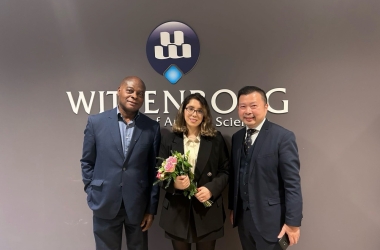Combining Strategy and Adaptability: Zahra Abedini's Journey in the Netherlands
Combining Strategy and Adaptability: Zahra Abedini's Journey in the Netherlands
Combining Strategy and Adaptability: Zahra Abedini's Journey in the Netherlands

https://www.wittenborg.eu/combining-strategy-and-adaptability-zahra-abedinis-journey-netherlands.htm
A Path of Learning, Resilience and Global Career Development
Wittenborg graduate Zahra Abedini is not afraid to take big steps to achieve her goals, having lived and studied in Iran, India and the Netherlands.
Originally from Tehran, Zahra earned a bachelor’s degree in Electrical Engineering. After graduation, she transitioned into the business world, taking on a role as a data analyst at a trade company. Her work involved managing relationships with international suppliers, a task that broadened her horizons and inspired her to move abroad.
“We had very important suppliers from India, so I decided to pursue my first master’s degree, in Marketing & Human Resources, at the Indian Institute of Technology Madras (IITM), one of the country’s best universities. This way, I could study while being in contact with our suppliers and managing relationships with them,” she says.
After returning to her job in Iran, Zahra set her sights on further expanding her qualifications, with an initial plan to move to Canada. Although a Canadian university accepted her, her immigration applications were denied multiple times during the COVID-19 pandemic. “This made me change my focus to Europe, and I figured that the Netherlands was the ideal destination due to its English-speaking environment, which provides international professionals access to the job market.”
Her choice of Wittenborg’s Master of Business Administration (MBA) in Smart Industry was equally strategic. Zahra explains that she was drawn to the school’s identity as a university of applied sciences, a model that aligned with her professional experience and her desire for a practical, rather than purely theoretical, education. “I liked how the programme blended business subjects with data analytics and artificial intelligence, including a practical, data-science-related thesis. It was a perfect fit for my goals, as I wanted to study something different from what I already knew.”
While studying for her degree, Zahra had to overcome financial challenges and manage the demands of balancing work with her studies. This was particularly difficult during her seven-month internship at ASML, a major semiconductor company. “I was living in Amsterdam and working in Eindhoven, so I had to go on a five-hour round trip every day. It was a time of intense pressure, and the internship was very demanding.”
Despite the challenges, the ASML internship proved to be an enriching professional experience. It was there that she truly understood the nuances of Dutch organisational culture. “The organisational culture is flatter in the Netherlands, while in Iran it is more hierarchical. On top of that, the projects here are highly professional and operate at a deeper level, so I needed to adopt a different way of thinking. I was a different person after my internship at ASML. It gave me a lot – not only technical skills but also helped me develop my professional attitude.”
Zahra highlights that Wittenborg lecturers were very supportive and helped her advance in her career. “Lasantha De Silva introduced me to my first job, and after I graduated, Professor Gabor Molnar, who was my thesis supervisor, helped me secure a position at Divitel, where I worked as an AI engineer for a year. But this also happened because I spoke up and communicated with my professors. Students need to be proactive and not just wait for opportunities to come to them.”
Today, Zahra works as a business data analyst and also manages supply chains at Nike, a role she describes as a dream come true. A lifelong sports fan, the opportunity to work for the company held deep personal significance for her. “Joining Nike was a very meaningful moment for me because I had always wanted to be in a sport-related environment. On top of that, the organisational culture is very friendly and supportive. It’s a challenging job, as the company has 800 factories worldwide and we have many tasks, but it is rewarding and I’ve been learning a lot.”
Regarding her career goals, Zahra plans to stay at Nike and progress into a managerial position, leveraging her dual expertise in data and operations. She also dedicates time to learning project management to further her professional development.
When asked for advice for current students, she emphasises the importance of a well-defined plan from the very beginning. She encourages students to proactively research job descriptions on platforms like LinkedIn to identify in-demand skills, to invest in networking and to seek out internships to gain invaluable professional experience and cultural understanding.
Zahra points out that the most valuable lessons she has learned are the importance of planning and the need for flexibility. “Immigration is all about coming out of your comfort zone. You need to be adaptable and prepared for everything, because even your most structured plans can go a different way than you imagine. But having a clear plan from the start is essential,” she concludes.
WUP 29/09/2025
by Ulisses Sawczuk
©WUAS Press
Tags
#SDG9: Industry, Innovation and Infrastructure
#Internationalisation
#Diversity
#highered
#internationalstudent
#studyinholland
828 words